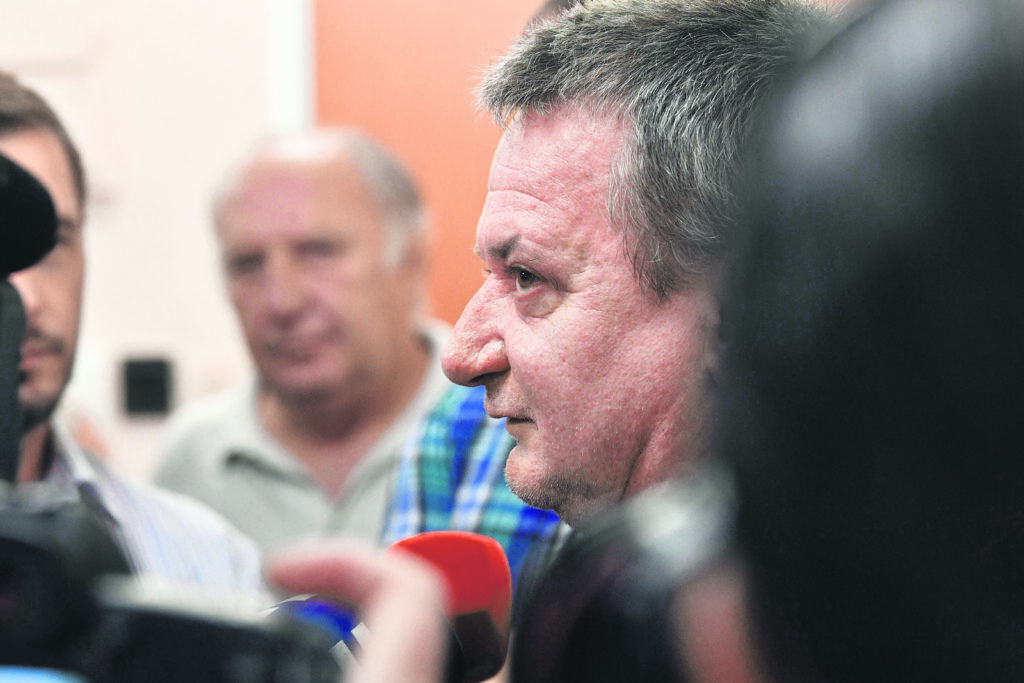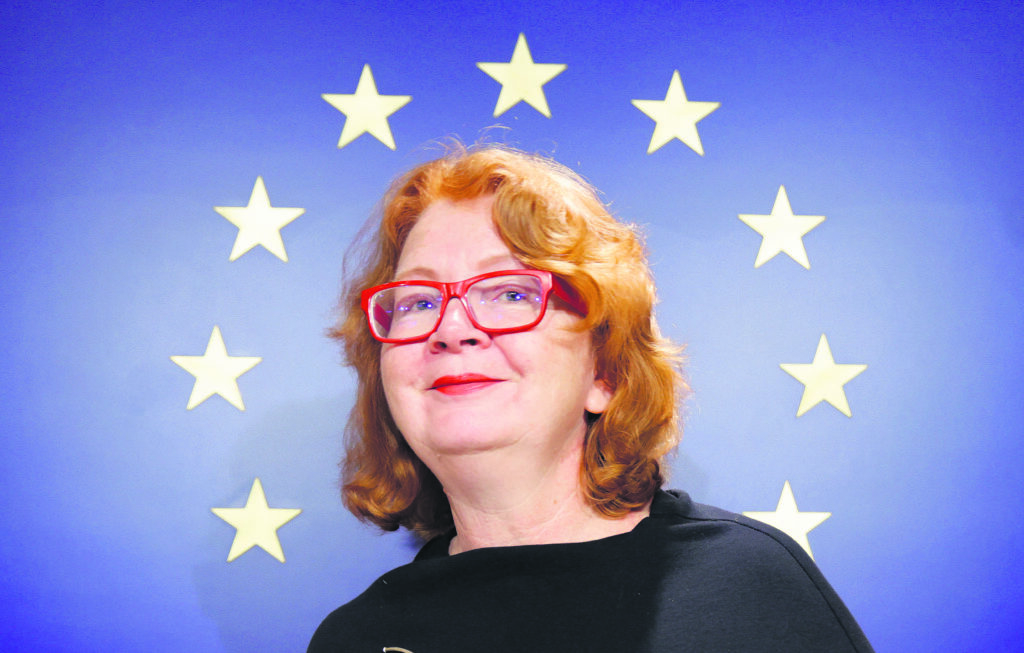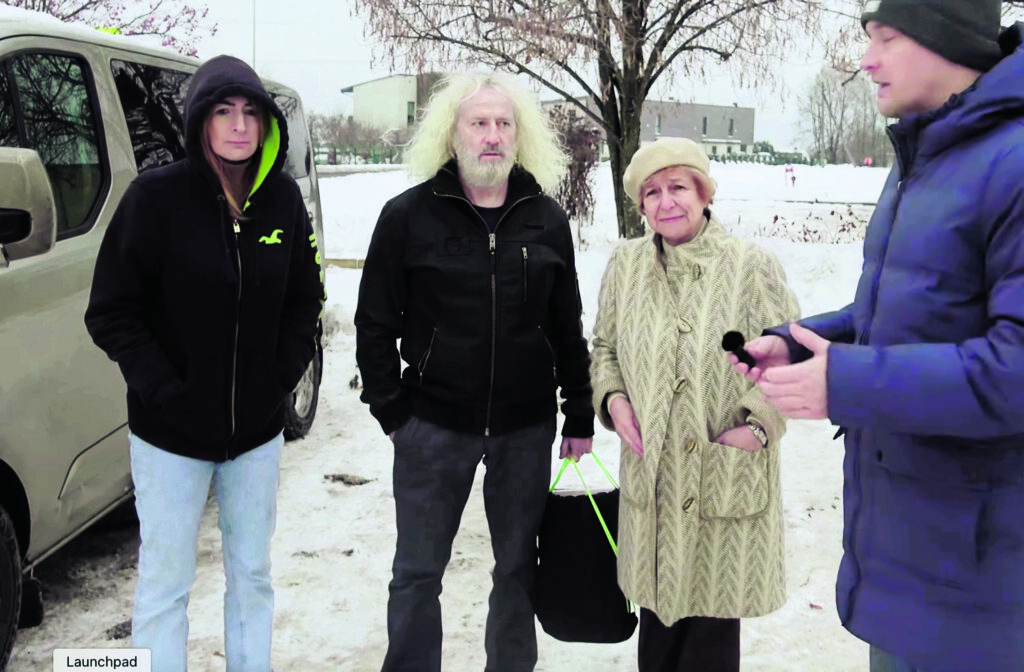Suspicions are growing about the Kremlin’s long-standing influence in Europe’s corridors of power, but there are no ideas yet on how to combat it
Māris Antonevičs, “Latvijas Avīze”, Lucie Sykorova, “HlidaciPes”
During the last parliamentary term, the European Parliament saw up close the dark side of itself that it had not seen before or did not want to see – that past and present politicians use their mandate for selfish purposes or even in the interests of enemy forces. There have been bold statements and a determination to “come clean”, but the question remains – will this year’s European Parliament not soon find itself in the same situation?
Even to punish those caught, there are roundabouts
First, at the end of 2022, the Parliament was caught up in a high-profile corruption scandal when Belgian police pressed charges against several politicians, including one of the EP’s vice-presidents, the Greek socialist Eva Kaili. They are suspected of accepting bribes to promote and defend the interests of the rich Middle Eastern state of Qatar in Europe. Not with such a bang, but it has become clearer and clearer that money has also been coming from Russia for a long time. In this case, however, it is not just about financial influence, as Moscow uses a variety of means. The problem is that so far there have been no mechanisms in the EP to prevent or even mitigate such influence and, as the scandal involving the long-serving Latvian MEP Tatjana Ždanoka has shown most clearly, there still are none.
At the end of January, journalist organisation the Insider published a piece about Ždanoka’s cooperation with Russian FSB officers. The President of the European Parliament, Roberta Metsola, immediately announced that she took it “very seriously” and the case would be referred to the Code of Conduct Advisory Committee. Practically immediately, on 6 February, a special European Parliament debate was held in Strasbourg on the matter, and a resolution was adopted stressing the need to strengthen resistance to Russian interference and to prevent agents of Kremlin influence from using the resources of the European Parliament for their activities. On 10 April, a penalty was announced – Ždanoka will be fined EUR 1750 per day for five days and will not be allowed to represent the Parliament at conferences, foreign visits and other events until the end of the current parliamentary term. It is clear that the EP wanted to react to what had happened and to show that such actions would no longer be tolerated, but it has had to do so almost in a roundabout way. The penalty looks rather symbolic. As Ždanoka herself has revealed, officially it is for filing a declaration incorrectly.
MEP Sandra Kalniete, in an interview with Latvijas Avīze, admits that this is the only thing the Parliament can do at the moment: “In the Saeima we have the Rules of Procedure, in the EP we have the Code of Conduct. They set out the maximum penalties and what they are for. Of course, they are not for espionage or working in the interests of another country. That is more of a matter for the security authorities. The European Parliament is practically without the tools to sort these things out at the moment. Apart from the MEP’s own commitment to the rules of conduct, there is nothing else. That is a very serious problem.”
In Latvia, the State Security Service (VDD) has brought criminal proceedings against Ždanoka, but initial public comments do not suggest that the case will actually go to court. In a statement in January, the VDD said that until 2016, Latvian legislation did not criminalise helping a foreign state or a foreign organisation to turn against the Latvian state, so the information published by the Insider between 2005 and 2013 does not qualify as a crime.

However, in the past, an MEP has been convicted for spying for Russia – in 2015, the immunity of Hungarian right-wing Jobbik politician Béla Kovács was revoked. In 2017, he was convicted for spying for Russia and in September 2022, the Supreme Court of Hungary sentenced Kovács to a five-year suspended sentence. At the moment, Kovács is allegedly living in Russia. In June 2023, a European and international arrest warrant was issued against him. But of course there are suspicions about many others, including those elected from the Baltic States, both in the current and previous terms.
Estonians have their own Ždanoka
In Latvia’s case, of course, we should straight away mention Andrejs Mamikins, a former Harmony (Saskaņa) politician who was an MEP from 2014 to 2019. After the State Security Service began criminal proceedings against him last year for allegedly praising and justifying Russian crimes in Ukraine, Mamikins fled to Moscow, where he now works openly as a Kremlin propagandist. However, before that, he worked briefly as an assistant to Estonian MEP Jana Toom.

Toom has been a MEP since 2014, having previously been a Member of the Estonian Parliament (2011-2014) and Deputy Mayor of Tallinn (2010-2011). According to the Estonian newspaper Postimees, Jana Toom (née Chernogorova) initially had no desire to have a future in post-independence Estonia and moved to Chelyabinsk in Russia after the collapse of the USSR in the early 1990s but changed her mind and returned to Tallinn four years later. She only became an Estonian citizen in 2008 after naturalising, but before entering politics she was a journalist and editor at several Russian-language newspapers in Estonia. Toom has often been compared to Tatjana Ždanoka, as their activities and interests often overlapped. The difference is that Toom represents the Centre Party, which is quite influential in Estonian politics, has always controlled politics in the capital and until recently led the government, while Ždanoka’s Latvian Russian Union (Latvijas Krievu savienība, formerly PCTVL) has been a rather marginal force in Latvia. In its 2011 report, the Estonian security service KaPo classified Toom’s activities as anti-state, which at the time were linked to political efforts by her and several other Centre Party members to impede with the Estonian school reform – the transition from Russian-language schools to education in Estonian. The politician challenged this KaPo assessment in court, which partially met her claim. Like Ždanoka, Toom has often appeared in the Kremlin’s propaganda media, giving them the message they need. In Estonia, her phrase in an interview with the newspaper Russkij korespondent, referring to the Estonian language, is often recalled: “Only 900 000 people speak this language. It is a dying language, a dying nation…”
In the European Parliament, Toom has dealt mainly with such issues as attempts to extend the influence of the Russian language, concern for minorities, cooperation with Russia. Together with Ždanoka and Mamikins, as well as two Italian and one Spanish MEP, she paid a special visit to Syrian dictator Bashar al-Assad in 2016 – at a time when Putin had taken international custody of Assad and such a visit by MEPs was in line with the Kremlin’s agenda at the time. Although Toom has started to waver after Russia’s full-scale invasion in Ukraine, she has made many excuses for her past actions, including claiming in an interview with Estonian public media, after the Ždanoka scandal, that she was “not friends with Ždanoka and had no close contact” and denying that she had any relations with the Russian special services. However, Toom’s pro-Russian activities have not diminished, which, together with the Centre Party’s inability to clearly position itself in these circumstances, has been one of the reasons for the party’s internal crisis. Several MPs have recently resigned from the party, including one of the best known Centre Party politicians, former Prime Minister Jüri Ratas.
Paleckis dynasty
From 2004 to 2014, Lithuania was represented in the European Parliament by Justas Vincas Paleckis, a Social Democratic Party member who comes from a well-known Lithuanian communist family. His father, Justas Paleckis, became the head of a puppet government after the Soviet occupation in 1940 and declared himself “President” of Lithuania for less than a month, before later holding various high-ranking positions in the Soviet power structures. Justas Vincas Paleckis, who originally obtained a journalism degree at Vilnius University, graduated from the USSR Higher Diplomatic Academy in Moscow in 1969 and worked for a long time in various diplomatic posts, including the USSR embassies in Switzerland and the German Democratic Republic, later building a career in the Communist Party of the Lithuanian SSR. In the late 1980s, Justas Vincas Paleckis was among the Lithuanian Communists who joined the pro-independence movement. This gave him the opportunity to gain positions with the new government, becoming foreign affairs adviser to the President – another former Communist – Algirdas Brazauskas, and later Ambassador to the United Kingdom, Portugal and Ireland. In the European Parliament, Paleckis took a moderately pro-Russian stance, which at the time consisted more of calls for strengthening the European Union’s ties with Moscow and, more broadly, for so-called “Finlandisation”, which Paleckis often cited as a good example. There were also attempts to reach concrete decisions, such as a visa-free regime with Russia. “When the former Eastern bloc countries joined the EU, many hoped that they would follow with the same proposals as Finland had made earlier – for better relations with Russia. (..) Unfortunately, ideas of worsening relations and confrontation with Russia are coming from a large number of these countries,” the MEP stressed in a 2013 interview with Baltnews. He has also often criticised leading Lithuanian figures, such as former President Dalia Grybauskaitė, for being too harsh in their rhetoric towards Russia. As Paleckis once told the 15min.lt website: “You have to speak more carefully in front of the cameras [about Russia], because these statements can have an impact on the situation of every Lithuanian citizen.” However, until 2014, such a pro-Russian stance was not viewed with suspicion in Europe, despite Russia’s increasingly visible dictatorial tendencies, its growing aggression in international politics and its attempts to interfere in the politics of other countries. Paleckis’ activities in getting the Latvian Social Democratic Workers’ Party (Latvijas sociāldemokrātiskā strādnieku partija, LSDSP) expelled from the socialist group in the European Parliament and replaced by the pro-Russian Harmony are also notable. “Back then we were very upset about this situation. Lithuanian colleagues claimed that it was his personal wish and not the position of the Lithuanian Social Democratic Party,” recalls LSDSP leader Jānis Dinēvičs, who does not rule out that it could have been done in Moscow’s interests.
Paleckis’ own activities for Russia are not so striking in comparison with what his son did. Algirdas Paleckis, who, like his father, initially worked for the Lithuanian foreign service, later joined the Social Democratic Party, served as vice-mayor of Vilnius and as a member of the Lithuanian Parliament, was arrested in autumn 2018 on suspicion of spying for Russia. According to the indictment, Algirdas Paleckis, together with another accused, Vilnius businessman Deimantas Bertauskas, in an organised group with a Russian intelligence officer and several other Russian citizens, worked on behalf of the Russian FSB in Lithuania. Their task was to gather information on the so-called 13 January case, considered one of the largest and most important in Lithuanian judicial history, which assessed the massacre at the Vilnius TV tower on 13 January 1990 and other crimes committed at that time. Russian special services wanted to obtain detailed information about the Lithuanian judges and law enforcement officers involved in the case. In 2019, the Šiauliai Regional Court found Algirdas Paleckis guilty and sentenced him to six years in prison, which was upheld by the Supreme Court of Lithuania. It is significant that Paleckis, who was convicted of espionage, was visited in Kaunas prison in 2022 by a special group of MEPs – Tatjana Ždanoka and two Irish MEPs, Claire Daley and Mick Wallace – to express their support for him.
A lot of suspicions, evidence being sought
Now, more attention is being paid to Russia’s influence in other countries. It is known there that some representatives in the European Parliament are under a shadow of suspicion, even if there is no direct evidence of working for the Russian special services at the moment. According to Czech MEP Tomáš Zdechowski, the European Parliament itself has not yet been able to engage effectively on this issue. “We have repeatedly drawn attention to this problem. But unless we have direct evidence, it can be appealed. At least now we are talking more about it and it is becoming clear that there is also a risk of losing trust in the European Parliament,” he told the Czech online media HlidaciPes.org. “In this context, Czech MEPs from the left-wing party KSČM (also known as the Communist Party of Bohemia and Moravia – Ed.) have also been discussed, in particular Jaromír Kohlíček (MEP from 2016) and Miloslav Ransdorf (MEP from 2004 to 2016). They have organised various Russian think tank meetings, as well as the so-called Pan-Slavic meetings.
The Swedish communists invited various prominent figures from China to the EP, and the Spanish left-wing MEPs invited Cuban agents here,” Zdechowski recalls, recommending to pay attention not only to the activities of the MEPs themselves, but also to their assistants. The corruption scandal involving Qatari lobbying also shows that they can often be deal-makers. It involves not only MPs, but also other parliamentary staff, including, for example, Eldars Mamedovs from Latvia. Tomáš Zdechowski: “Whenever I discussed a resolution with Antonio Panzeri, the protagonist of “Qatargate”, he was accompanied by Eldars Mamedovs, who was an adviser to the political group of the Progressive Alliance of Socialists and Democrats (S&D). And he always rejected any amendments that were against Russia, Azerbaijan or Iran. Mamedovs always worked with MEPs who worked on human rights resolutions. He always had brilliantly prepared reasoning, he basically worked on this one topic. He was very skilled at manipulation and he managed to get a majority for his proposals through the secretariats of the MEPs.”
In April, a Chinese man who came to Germany as a student in 2002 and has worked for the AfD politician since 2019 was detained on suspicion for spying for China as an assistant to the Alternative for Germany (AfD) MEP Maximilian Kroes. Several MEPs have hired Russian citizens who support Putin’s regime – as interns, accredited parliamentary assistants and group advisers. In 2018 and 2019, Elizaveta Peskova, daughter of Vladimir Putin’s press secretary Dmitry Peskov, worked as an intern for French MEP Emeric Chopard (elected on the National Front list), who has emphasised many pro-Kremlin ideas in his political work.
What to do?
It is not difficult to spot MEPs who have worked in Russia’s interests – just look at the votes on resolutions condemning Russia (for example, following Russia’s full-scale attack on Ukraine, 13 MEPs voted against a resolution condemning the aggression, 26 abstained) or those promoting issues of importance to Russia. After 24 February 2022, however, many have become more cautious.

Among others, the Irish politician couple already mentioned as close to Ždanoka, Mick Wallace and Claire Daley, stand out. Journalists from the Irish Times have investigated the fact that for years they have been purposely spreading Kremlin-friendly messages, which have subsequently been republished not only in Russian media, but also in Chinese and Arab media. As with Ždanoka, Toom and many others, the propaganda is: look, even the prestigious, important representatives of the European Union agree and support us. The caught Ždanoka has now become so toxic that even the scandalous Irish, whose views have previously been described not only as left-wing but as “Trotskyist”, are trying to distance themselves from her. “We parted ways years ago,” Daley told the Irish Independent in January, but Wallace has avoided commenting on the matter at all. Interestingly, they are now trying to deny that they even visited Algirdas Paleckis, who was convicted of spying for Russia, in a Kaunas prison with Ždanoka, even though it was caught on video and can be seen on YouTube. The explanation is that they did not travel with Ždanoka, it just so happened that they were there at the same time.
Kalniete, who stressed in the February debate on the Ždanoka scandal that “she is not the only one”, now says that she can only be suspicious when assessing the content of MEPs’ speeches and votes. For example, Marcel de Graaf, MEP for the Netherlands, said in the plenary debate that reports of Ukrainian children being deported to Russia were just propaganda. Similarly, the French MEP Gilles Lebreton has always taken a position against Ukraine, but his statements often coincide with Kremlin propaganda. “Nils Ušakovs and Andris Ameriks have recently retained their immunity in the EP on the basis of Lebreton’s report. Although this is a minor issue, it shows the influence one MEP can have,” said Kalniete.
But what to do? The European Parliament is currently reacting to information that comes into the public domain, says political analyst Andis Kudors. This increased attention is due to the war in Ukraine. “That is all well and good, but the European Parliament does not really have the tools to see for itself who is a Russian spy and who is not. It is not a national parliament that can ask questions to its own national security service. It is very difficult for them to get information,” Kudors concludes. He doubts that any new institution could be created in the EU to deal with such a problem, and it is unlikely that there would be broader support for it. Clearly, responsibility will remain at national level.
Sandra Kalniete believes that more could be done at European Parliament level: “An internal security system should be introduced. Something like in Latvia, where only MEPs with security clearance are allowed to work on certain issues. Knowing the composition of the EP, with the left, the liberals and so on, it will be very difficult to convince them of this.” In any case, the next EP term will have to deal with this, and it is unlikely that there will be fewer advocates of Russian interests.
The European voice turns out to be the Russian voice
l At the end of March, Czech Prime Minister Petr Fiala announced that his country’s security service had uncovered a large-scale Russian influence operation using the online publication European Voice. Viktor Medvedchuk, a Ukrainian oligarch close to Putin, and his associate Artjoms Marčevskis were behind it. Although based in the Czech Republic, the aim was much broader. Some of the activities were related to efforts to influence the European Parliament elections in June. “European Voice has long sought to influence public opinion in several European countries, including the Czech Republic. The content was controlled and directly financed by the Russian Federation. Money from Moscow has also been used to pay some politicians to spread Russian propaganda. The amounts involved are in millions,” reads a statement by the Czech Security Information Service (BIS) on 28 March.
So far, the names of the two leading candidates of the German AfD – Maximilian Krah and Petr Bystron – have emerged in connection with the scandal. Both gave interviews to European Voice with Russian-dominated messages and, according to the intelligence services, they were not just their political views, but they also received a very generous remuneration.
“We have hit one of the main places from where the Russian Federation spread its propaganda. However, it is essential that we trace the money flows accurately and provide clear evidence of how it worked,” said BIS Director Michal Koudelka on the European Voice scandal.

